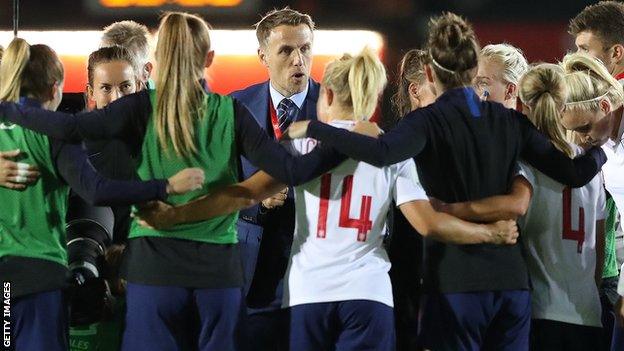Phil Neville: England match against Brazil will be treated as a World Cup game
- Published

Phil Neville was name as the England women head coach in January 2018
England women's friendly against Brazil will be treated "as a World Cup game", says head coach Phil Neville.
The Lionesses play Brazil, ranked eighth in the world, on Saturday and sixth-ranked Australia on Tuesday.
Neville said he wanted to test his players against the best possible opposition before the 2019 World Cup.
"Are we ready to win a World Cup today? I don't think we are because I think there is still more to come from this team," Neville told BBC Sport.
England, who secured their place at next year's World Cup in France with an unbeaten qualifying campaign in September, also face Sweden next month.
Neville, 41, said his side were "totally driven to improve and be the best".
"This is not a friendly to me - this is a World Cup game," he said.
"I think we've got a real good test coming up - three different styles, from different continents. That's what the World Cup is all about.
"We have to play our style - can we beat these kinds of teams?"
England, who are third in the world rankings, finished third at the 2015 World Cup.
They have won five and drawn two of their eight games under Neville, with their one defeat coming against the United States in the SheBelieves Cup.
"The US won the last World Cup and they used 22 players. I need 23 players at the level to win a World Cup," Neville added.
"The players know that over the next eight months, every single one of them will get an opportunity to play."
Central contract restructure 'exciting for players'
The Football Association will restructure the women's central contract system, with the top players to be paid £30,000 by the FA.
England players were first awarded central contracts in 2009, with players securing a pay increase in 2013.
The new structure will introduce four levels of contracts, which are:
Young players with the potential to play for the senior team
Junior England players
Senior England players
Seniors who are coming to the end of their careers
Baroness Campbell, the FA's director of women's football, told BBC Sport the FA had consulted with players about the changes.
"They're very excited by it. They're quite happy about the differentiation between the proven internationals and the aspiring internationals," Campbell said.
"We think it's an important part of encouraging and supporting our best players to do well.
"We want to give those players [at level four] a parachute payment to help them become coaches, referees - to help them move out of football and into something meaningful and productive for them."